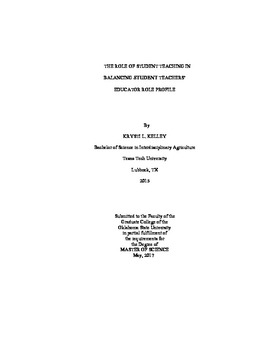| dc.contributor.advisor | Baker, Marshall A. | |
| dc.contributor.author | Kelley, Krysti Lauren | |
| dc.date.accessioned | 2018-03-13T18:15:54Z | |
| dc.date.available | 2018-03-13T18:15:54Z | |
| dc.date.issued | 2017-05-01 | |
| dc.identifier.uri | https://hdl.handle.net/11244/54548 | |
| dc.description.abstract | Over the past several years, agricultural education has faced a shortage of qualified teachers to fill the ever-growing vacancies throughout the United States. This lack of qualified teachers has put the pressure on teacher preparation programs to take on the challenge of preparing student teachers to thrive in the experiential world of agricultural education. Previous studies have focused on teacher preparation but few studies have examined the effectiveness of teacher preparation programs, specifically the effectiveness of the student teaching experience, in preparing student teachers to be experiential educators. This non-experimental survey design study aimed determine the impact of the student teaching experience on student teachers' experiential educator skill development. Thirty-six student teachers from four representative universities in Oklahoma and Texas completed a modified summated needs assessment version of Kolb, Kolb, Passarelli and Sharma's (2014) Educator Role Profile three times: pre-, mid- and post- student teaching. The findings of this study revealed that student teachers were highly involved in high school agricultural education and the FFA but most did not grow up on a farm. It also found student teaching enhances all four roles in varying amounts and ways, narrows the gaps between importance and competence and between competence and authentic assessment, and grows perceived competence in all educator roles. Student teachers do not find being an expert important nor do they think they are good at it, are predominately coaches, and grew the most between the mid- and post-administrations in both importance and competence. Authentic Assessment revealed growth only in the facilitator role. Needs assessments in each administration indicated that student teachers have different skill needs at distinctive stages of their student teaching experience. Recommendations include providing opportunities to connect with the agricultural industry and agricultural content, reevaluating agricultural education course requirements, using the ERP as a part of the student teacher feedback process, educating student teachers are the importance of utilizing the stages of ELT and the ERP roles in their classrooms and providing cooperating teachers with training on the educator roles to improve evaluation. | |
| dc.format | application/pdf | |
| dc.language | en_US | |
| dc.rights | Copyright is held by the author who has granted the Oklahoma State University Library the non-exclusive right to share this material in its institutional repository. Contact Digital Library Services at lib-dls@okstate.edu or 405-744-9161 for the permission policy on the use, reproduction or distribution of this material. | |
| dc.title | Role of Student Teaching in Balancing Student Teachers' Educator Role Profile | |
| dc.contributor.committeeMember | Robinson, Jeremy S. | |
| dc.contributor.committeeMember | Terry, Robert, Jr. | |
| osu.filename | Kelley_okstate_0664M_15186.pdf | |
| osu.accesstype | Open Access | |
| dc.description.department | Agricultural Education | |
| dc.type.genre | Thesis | |
| dc.type.material | text | |
